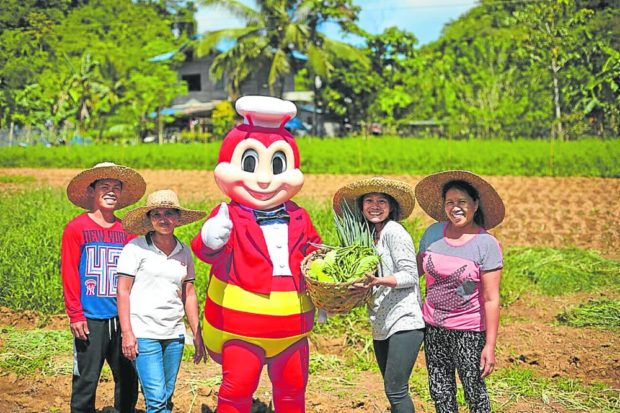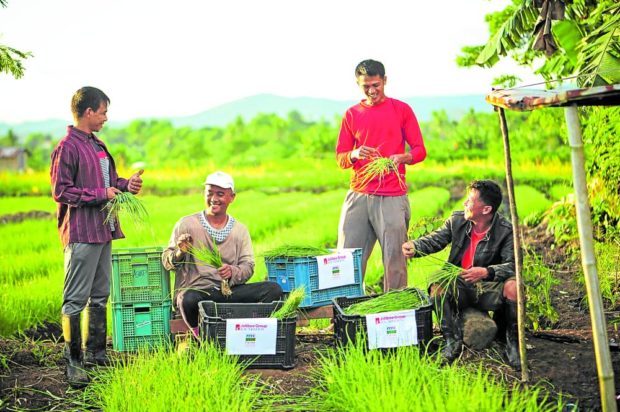The little known crew behind the success of Jollibee

SUPPLY CHAIN Jollibee Group Foundation has been supporting Filipino farmers through training programs and market access initiatives. —CONTRIBUTED PHOTO
Jollibee Foods Corp. is a conglomerate with numerous restaurants in its portfolio, serving customers its world-famous fried chicken, pizza, pasta, cake and many more. Naturally, it has a huge requirement when it comes to the food supply chain.
So it is only wise to establish a good relationship with farmers for their ingredients, ensuring sustained operations.
“Jollibee Group has always preferred to go directly to the source of its vegetables as much as possible,” Jollibee Group Foundation (JGF) executive director Gisela Tiongson tells the Inquirer.
With this in mind, the foundation has been implementing the Farmer Entrepreneurship Program (FEP) since 2008, or for nearly 15 years now.
“The program’s primary goal is to empower small producers to become agroentrepreneurs who can collectively supply institutional buyers—such as Jollibee Group’s brands—so that they can have a more sustainable livelihood and income,” Tiongson explains, noting they have been teaming up with local government units and nongovernmental organizations (NGOs), among others, to realize the goals of FEP.
The foundation also recognizes the struggles of Filipino farmers who, despite their crucial role in society, are still getting the short end of the stick.
“For context, one in every five Filipino workers is employed in agriculture, but this sector is still the poorest among the basic sectors. Smallholder farmers dominate agricultural production in the Philippines, but most of them are struggling to improve their farming practices and find buyers due to a lack of access to training and technologies,” Tiongson laments.
And so JGF has found it imperative to extend a hand to the agriculture sector to ensure that the country’s—and not just Jollibee’s—food supply chain is stable. The conglomerate has put up initiatives to make sure Filipinos have food on their table and farmers are resilient to the changing times.
Market access
One of FEP’s goals is to improve farmer-partners’ participation in the agriculture value chain in order to maximize their earning potential.
“Typically, farmers sell their produce to traders and local markets, limiting the farmers’ incomes. Even if small farmers want to directly supply bigger markets, they are usually unable to do so because they are more oriented to serve as producers and lack the knowledge and skills to operate as a business that understands the needs of their market,” Tiongson points out.
She says these farmers only have small parcels of land and are likely to have no access to technologies that help increase yields.
A project initiated by Jollibee to address this is the clustering of small-scale farmers so they can consolidate their produce for selling to big buyers.
The foundation’s farmer-partners are also now supplying white onions, green bell peppers, tomatoes and other vegetables to Jollibee, Chowking, Greenwich and Mang Inasal.
“Since we introduced farm clustering to farmers, FEP farmers can scale their operations, successfully maintain their status as Jollibee Group suppliers and find other markets,” Tiongson shares.
Some 17 farmer groups have been accredited as suppliers of the Jollibee Group since the program started.
As the farmers’ operations grew, they needed to comply with standards such as the Philippine Good Agricultural Practices (PhilGAP) promoted by the Department of Agriculture (DA).
PhilGAP underscores the importance of food safety, which fosters good health for consumers. Compliance with the standards also opened more doors for these small-scale farmers.
“Our partner-farmers are able to also bid for the requirements of other restaurants, hotels and supermarkets,” Tiongon says.
Agroentrepreneurship
Bridging market access is crucial, but JGF takes it a step further by empowering the farmers to become entrepreneurs themselves.
The foundation offered agroentrepreneurship and leadership training to increase their knowledge in better navigating the market.
JGF has expanded this initiative to help more farmers, even at the height of the pandemic when mobility was restricted.
In 2021, it developed an online program called “Agro-Entrepreneurship for Inclusive Agriculture Value Chains.”
Tiongson explains the program brings together academic discipline from a university partner and practical insights from the FEP.
“It seeks to contribute in capacitating more agri-extension or field facilitators who, in turn, coach smallholder farmers on agroentrepreneurship,” she says.
A total of 167 agroenterprise facilitators coming from 84 organizations have completed the introductory course as of November. Participants were from the Department of Agriculture (DA), local government units, nongovernment organizations, financing institutions, farmer cooperatives and associations, social enterprises and the academe.
Tech-up
It is also the aspiration of FEP to expose Filipino farmers to new technologies that can aid their work.
“We work with various organizations to help our farmer-partners gain access to leading-edge technologies that increase their yield and reduce their costs, making them more competitive,” Tiongson says.
The foundation has collaborated with IBM’s The Weather Company for localized barangay-level, 15-day weather forecasts.

STABLE SUPPLY The Jollibee Group has accredited 17 farmer groups to fulfill its ingredients list. —CONTRIBUTED PHOTO
JGF also worked with Central Luzon State University in analyzing and interpreting weather data in order to come up with prescribed farming practices.
“That means the information helps our partners to manage resources such as time, seeds, and fertilizers to eventually increase their yield, reduce farming costs, and make them more competitive in the market,” Tiongson explains.
The project is supporting about 116 farmers in 12 barangays across San Jose City, Nueva Ecija and Alcala, Pangasinan.
Eddie Soriano, chair of the Nueva Ecija-based Onion and Vegetable Producer Cooperative, earlier said that the weather forecast has “become a guide for our daily farming.”
Looking ahead
JGF is still looking ahead to support the next generation of farmers.
“The Philippines’ farming population is growing older. The average age of the Filipino farmer is around 57 years old, raising concerns on who will carry out this critical task in the future,” she says.
The JGF, in response, provides young farmers scholarships in agroenterprise.
Through this program, over 480 underprivileged youth were able to graduate from technical-vocational courses in agriculture.
It has teamed up with Don Bosco Training Center in Davao Oriental in crafting a course, which was eventually accredited by the Technical Education and Skills Development Authority last year.
The JGF has also provided training through the Sacred Heart Savings Cooperative community-based training center in Galimuyod, Ilocos Sur and the Lamac Multi-Purpose Cooperative Integrated Organic Farm School in Cebu.
Among the pioneer batch of trainees in Sacred Heart Savings was 24-year-old June Batao-ey, who was exposed early to agriculture coming from a family of smallholder farmers. He recalled learning how to plant rice, fruits and vegetables at a much younger age.
The Jollibee Group’s program gave him a deeper understanding of the business aspect of farming, such as cost analysis and marketing.
Batao-ey recently passed the board exam for Agricultural Engineering. He continues to help in his family’s farm, applying what he has learned about agroentrepreneurship.
To further support the same initiative, the conglomerate has relaunched its “coin banks,” which are available on digital platforms and on the counters of Jollibee, Greenwich, Chowking, Red Ribbon, Mang Inasal, Burger King, Highlands Coffee, Panda Express and Yoshinoya stores. These coin banks give customers an opportunity to donate and support the cause.
“Proceeds from our Scholarship Coin Banks support the youth who want to become successful agroentrepreneurs. Many of them are sons and daughters of farmers themselves,” Tiongson says.
Since relaunching in October, JGF has already received P500,000 worth of donations from customers.
Moving forward
The seeds the foundation sowed over a decade ago continue to yield abundant harvest.
JGF is keen on planting more of these seeds as it intends to continue supporting a vital aspect of a country’s survival.
“Jollibee Group Foundation is continuously looking for ways to better support our farmer-partners and to have more farmers benefit from the program,” Tiongson vows.
Read Next
Subscribe to INQUIRER PLUS to get access to The Philippine Daily Inquirer & other 70+ titles, share up to 5 gadgets, listen to the news, download as early as 4am & share articles on social media. Call 896 6000.
For all the latest Business News Click Here
For the latest news and updates, follow us on Google News.



